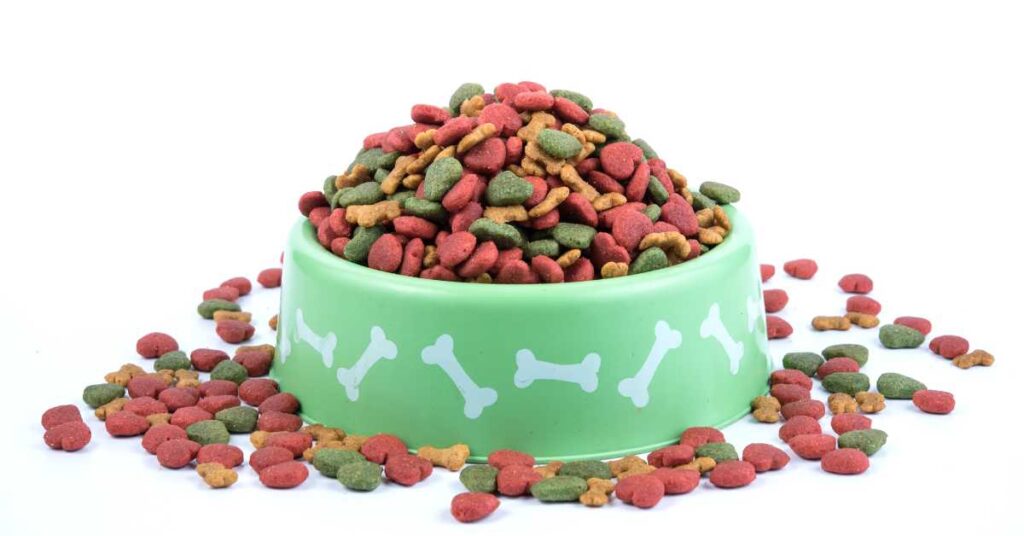You know the saying ‘you are what you eat.’ Well, the same holds true for your Schnauzer’s health and well-being.
How often you feed your furry friend plays a crucial role in maintaining their overall health and happiness. But just how frequently should you be filling up their food bowl?
Let’s explore the factors that determine the ideal feeding schedule for your Schnauzer, ensuring they receive the nourishment they need.
Key Takeaways
- Establish a consistent feeding schedule to regulate metabolism and prevent overeating.
- Monitor food intake for weight management and adjust portions based on activity level.
- Divide daily food into 2-3 meals for better digestion and energy distribution.
- Consult a vet for tailored feeding guidelines to ensure a balanced diet at specific times daily.
Schnauzer Feeding Guidelines
When feeding your Schnauzer, it’s important to establish a consistent schedule to maintain their health and well-being. Weight management and portion control are crucial aspects of their feeding regimen. Schnauzers are prone to weight gain, so it’s essential to monitor their food intake carefully. Dividing their daily food into two or three meals can help with portion control and prevent overeating. Meal timing plays a significant role in their digestion and energy levels. Ensure that you feed your Schnauzer at the same times each day to create a routine that they can rely on.
Additionally, treats should be given in moderation. While treats can be used as rewards during training, excessive treats can lead to weight issues. Opt for healthy, low-calorie treats and limit the number given each day. By following these feeding guidelines, you can help your Schnauzer maintain a healthy weight and overall well-being.

Understanding Schnauzer Nutritional Needs
Understanding the nutritional requirements of your Schnauzer is essential for their overall health and well-being. Ensuring they receive proper nutrition through their diet is crucial for a happy and healthy pup. Here are some key points to consider:
- Nutritional Balance: Your Schnauzer’s diet should consist of a balanced mix of proteins, carbohydrates, fats, vitamins, and minerals. Protein is particularly important for muscle development and overall health, while carbohydrates provide energy. Fats are essential for a healthy coat and skin, and vitamins and minerals support various bodily functions.
- Portion Control: Controlling the portion sizes of your Schnauzer’s meals is vital to prevent overeating and obesity. Follow the recommended feeding guidelines provided by your veterinarian or pet food manufacturer based on your Schnauzer’s age, weight, and activity level. Avoid free-feeding and stick to scheduled mealtimes to maintain a healthy weight.
- Consulting a Professional: If you have any doubts about your Schnauzer’s nutritional needs, consult a veterinarian or a pet nutritionist. They can provide personalized recommendations based on your dog’s specific requirements and help you create a balanced diet plan for your furry friend.
Factors Influencing Feeding Frequency
To determine how often to feed your Schnauzer, consider various factors that influence their feeding frequency and overall nutritional requirements. Weight management is crucial in determining how frequently to feed your Schnauzer. If your Schnauzer needs to lose or maintain weight, portion control is essential.
Consult with your veterinarian to establish the appropriate portion sizes based on your dog’s weight and activity level. Meal timing also plays a significant role in feeding frequency. Pay attention to your Schnauzer’s hunger signals and establish a consistent feeding schedule to help regulate their appetite.
Feeding Schedule for Adult Schnauzers
Consider establishing a consistent feeding schedule for your adult Schnauzer to maintain their health and well-being. Here are some key points to keep in mind:
- Regular Feeding Times: Set specific times for feeding your adult Schnauzer each day. Consistency helps regulate their metabolism and digestion, promoting overall health.
- Portion Control: Monitor your Schnauzer’s food intake to prevent overeating and obesity. Follow the recommended portion sizes based on your dog’s weight and activity level to keep them at a healthy weight.
- Dietary Supplements: Consult with your veterinarian about incorporating dietary supplements into your Schnauzer’s diet. Supplements can help address specific health concerns or deficiencies, but it’s essential to use them appropriately and under professional guidance.
Feeding Puppies: What You Need to Know
When raising a Schnauzer puppy, it’s crucial to establish a proper feeding routine to support their growth and development. Puppies require more frequent meals than adult dogs to sustain their energy levels and promote healthy development. A good rule of thumb is to feed your Schnauzer puppy three to four times a day, dividing their daily portion into smaller meals. This helps prevent hypoglycemia, a common issue in small breeds like Schnauzers. Ensure the food you choose is specifically formulated for puppies to meet their nutritional needs.
In addition to feeding, early training is essential. Potty training your Schnauzer puppy requires consistency and patience. Take them outside frequently, especially after meals and naps, and reward them for going to the bathroom in the designated area. Socialization is also key. Introduce your puppy to different people, animals, and environments to build their confidence and prevent behavioral issues later on. Remember, a well-fed and socialized Schnauzer puppy is more likely to grow into a happy and well-adjusted adult dog.
Senior Schnauzers’ Feeding Recommendations
As your Schnauzer ages, adjusting their feeding routine becomes crucial to maintain their health and well-being.
- Health Benefits: Senior Schnauzers have specific nutritional needs to support their aging bodies. Providing them with a balanced diet can help prevent obesity, maintain muscle mass, and support their immune system.
- Dietary Requirements: Older Schnauzers may require a diet lower in calories to prevent weight gain, yet higher in protein to support muscle health. Additionally, supplements such as glucosamine and chondroitin can aid in joint health and mobility.
- Feeding Frequency: While the number of meals per day may remain the same, portion sizes might need adjustment to accommodate their changing metabolism. Consulting with your veterinarian can help tailor a feeding plan that suits your senior Schnauzer’s individual needs.
Ensuring your senior Schnauzer receives proper nutrition can lead to improved quality of life, increased vitality, and overall well-being as they age gracefully.
Adjusting Feeding Frequency for Active Schnauzers
To ensure your active Schnauzer maintains optimal health and energy levels, adjusting their feeding frequency is essential. Active Schnauzers have higher exercise requirements, burning more calories and needing additional fuel to sustain their activity levels.
It’s recommended to feed them smaller, more frequent meals throughout the day to provide a steady source of energy. This approach helps prevent dips in blood sugar levels and supports their metabolism. Be mindful of portion sizes and adjust them based on your Schnauzer’s weight management needs.
Monitoring their body condition and consulting with a veterinarian can guide you in determining the appropriate feeding frequency for your active companion. By aligning their meals with their exercise routine, you can ensure that your Schnauzer has the energy required to stay active and healthy.
Feeding Tips for Schnauzer Owners
For Schnauzer owners looking to optimize their pet’s feeding routine, incorporating practical feeding tips can enhance their companion’s overall health and well-being. Here are some essential tips to ensure your Schnauzer’s nutritional needs are met:
- Training Treats: When using training treats, opt for small, low-calorie options to prevent overfeeding. Use treats specifically designed for training purposes to maintain a healthy balance in your Schnauzer’s diet.
- Meal Portions: Divide your Schnauzer’s daily food portion into two or three meals to aid digestion and prevent overeating. Adjust the portion sizes based on your dog’s activity level and age to maintain a healthy weight.
- Monitor Caloric Intake: Keep track of the calories your Schnauzer consumes daily, including treats and meals. This will help prevent excessive weight gain and ensure your pet is receiving the appropriate amount of nutrition for their size and activity level.
Common Feeding Mistakes to Avoid
One common mistake Schnauzer owners make when feeding their pets is overindulging in table scraps, which can lead to digestive issues and obesity. While it may be tempting to share your food with your furry friend, it’s important to remember that their nutritional needs are different from yours. To avoid overfeeding, stick to a balanced diet specifically formulated for Schnauzers.
Another common error isn’t practicing portion control. It’s easy to unintentionally overfeed your Schnauzer, especially if you free-feed or use a large bowl that makes it difficult to gauge the correct portion size. To prevent this, measure out the appropriate amount of food for your Schnauzer based on their age, weight, and activity level.
Consulting With a Veterinarian
If you have concerns about your Schnauzer’s diet or feeding habits, seeking guidance from a veterinarian is crucial to ensure your pet’s health and well-being. Veterinarians can provide tailored advice based on your Schnauzer’s specific needs and help you make informed decisions regarding their nutrition.
When consulting with a veterinarian regarding your Schnauzer’s diet, consider the following:
- Dietary Supplements, Importance: Your veterinarian can recommend appropriate dietary supplements if needed, ensuring your Schnauzer receives essential nutrients for optimal health. They can advise on the correct type and dosage of supplements to support your pet’s well-being.
- Homemade Diets, Pros and Cons: If you’re considering feeding your Schnauzer a homemade diet, your veterinarian can discuss the pros and cons. They can help you formulate a balanced homemade diet that meets your Schnauzer’s nutritional requirements or recommend commercial diets that offer complete and balanced nutrition.
Consulting with a veterinarian is essential for maintaining your Schnauzer’s health through proper nutrition. Trust their expertise to make the best choices for your furry companion.
Frequently Asked Questions
Can I Feed My Schnauzer Human Food as a Treat?
When it comes to feeding your schnauzer human food as a treat, remember to stick to safe training treats in moderation. Always practice portion control to ensure your furry friend stays healthy and doesn’t develop any unwanted habits or health issues.
Should I Adjust My Schnauzer’s Feeding Schedule if They Are Overweight?
To manage your schnauzer’s weight, adjusting portions is crucial. Consult your vet for a tailored feeding schedule. Monitoring calorie intake and incorporating exercise are key. Prioritize your schnauzer’s health with a balanced diet and routine.
Can I Free-Feed My Schnauzer Throughout the Day?
You should avoid free-feeding your Schnauzer throughout the day. This can lead to behavioral challenges and health implications like obesity. Instead, stick to a structured feeding schedule using training techniques to maintain a healthy weight and routine.
Are There Specific Feeding Guidelines for Schnauzers With Allergies or Sensitivities?
When dealing with allergies or sensitivities in your Schnauzer, it’s essential to consider allergy testing to identify triggers. Special diets tailored to your pup’s needs can help alleviate symptoms and improve their overall health and well-being.
How Do I Know if My Schnauzer Is Getting the Right Amount of Nutrients in Their Diet?
To ensure your schnauzer gets the right nutrients, focus on nutrient balance by providing a variety of high-quality foods. Practice portion control to avoid overfeeding or underfeeding. Consult your vet for personalized advice.
Conclusion
In conclusion, it’s important to feed your schnauzer according to their specific nutritional needs and activity level. By following feeding guidelines, adjusting frequency as needed, and avoiding common mistakes, you can help ensure your schnauzer stays healthy and happy.
Remember to consult with your veterinarian for personalized advice and recommendations to meet your schnauzer’s individual needs. With proper care and attention to their diet, your schnauzer can thrive for years to come.



